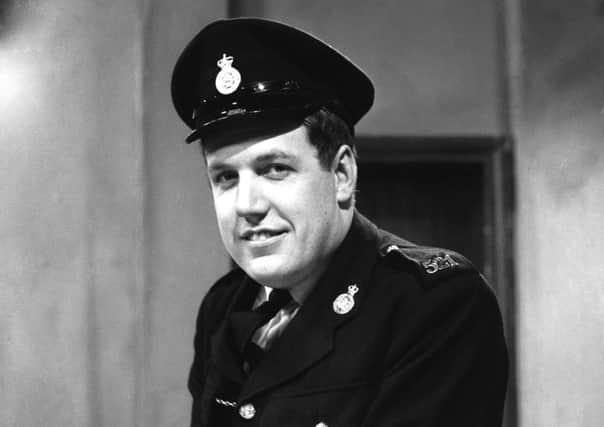Obituary: Colin Welland, performer and writer


Colin Welland was a renaissance man of stage and screen, a multi-faceted performer and writer whose career brought him success and acclaim at home and abroad. A stage and screen actor, a writer for theatre, film and television, an arts graduate and briefly in his youth an art teacher, a stand-up comedian and a BBC newsreader, his many interests combined to form a creative career of which any performer would be proud.
Although his working life was formed of an eclectic and tirelessly produced series of notable minor highlights, when Welland hit upon real successes they were of the truly attention-grabbing kind. Most famously, his screenplay for the 1981 hit Chariots of Fire, about the sporting and religious dynamic between British Olympic athletes Eric Liddell and Harold Abrahams, won him the Academy Award for Best Writing (Original Screenplay) the following year. When he held aloft his trophy upon receiving it and shouted: “The British are coming!” it was a bravura and still-remembered moment, although in truth it immediately preceded a lengthy Oscar drought for the country.
Advertisement
Hide AdAdvertisement
Hide AdThe win, however, set deserved recognition upon the life of a figure whose work was already familiar to British audiences, largely thanks to his on-screen appearances. A well-built man with a firm Northern accent, Welland appeared regularly in the ground-breaking police drama Z-Cars as PC Dave Graham between 1962 and 1965; as well-meaning teacher Mr Farthing in Ken Loach’s gritty, cult coming-of age film Kes in 1969; as the local Reverend in Sam Peckinpah’s highly controversial Cornwall-set Straw Dogs (1971), starring Dustin Hoffman; and as a detective in the 1971 Richard Burton-starring gangster film Villain. His appearance in Kes won him a Best Supporting Actor Bafta in the year the film was released.
Welland also appeared in both the television series The Sweeney in 1975 and its big-screen spin-off Sweeney! two years later, and wrote and featured in various television plays in the ITV Sunday Night Theatre, Play for Today and Armchair Theatre strands in the late 1960s and throughout the 1970s. He received Best Television Playwright awards in 1970, 1973 and 1974, as voted for by the members of the Writers Guild.
Born Colin Williams in Leigh, Lancashire, to parents Jack and Nora, Welland was raised in Kensington, Liverpool and later Newton-Le-Willows in Lancashire. His fascination with performance began at an early age, when he sang publicly in competitions, but his father hoped for a more secure employment for his son. Noting that he had an aptitude for art, he suggested that the young Colin train to be an art teacher and return to acting in later life if he chose, once he had a course of employment behind him.
Welland took his father’s advice. Educated at Newton-Le-Willows Grammar School, he went on to teacher training at the former Bretton Hall College of Education in the West Riding of Yorkshire, and to completion of a teacher’s diploma at Goldsmith’s College in London. Between 1958 and 1962 he worked as an art teacher, an experience which later informed his role in Kes.
At the age of 26 Welland’s wedding to Patricia (née Sweeney) was near, and he decided that the imminent responsibilities of marriage and possibly fatherhood would make it even trickier to follow his acting dream. He auditioned for the Manchester Library Theatre, where he sang a Gilbert and Sullivan song for then-artistic director David Scase, an enduring mentor and influence, and was immediately offered the lead in a forthcoming production of Harold Pinter’s The Birthday Party. He stayed with the Library for a year, and after a brief period as a local newsreader, was hired on Z-Cars.
Enjoying success and steady employment throughout the 1960s and 70s, it was in 1979 that Welland’s career entered its period of international recognition. The same year that he played one of the principals in Dennis Potter’s television play Blue Remembered Hills, a tale of seven-year-old children portrayed by actors including Michael Elphick and Helen Mirren, he also saw his first-written feature film released, director John Schlesinger’s Yanks. Featuring the fast-rising star Richard Gere and Vanessa Redgrave in a tale of Second World War American GIs stationed in England, it was a successful calling card in advance of Chariots of Fire.
Although he never again hit the heights of that Oscar-winning script, the decade following his win saw Welland combine acting at home with writing high profile films, often for American producers. He scripted the Gene Hackman and Ann-Margret-starring Twice in a Lifetime (1985), about a middle-aged steelworker caught in an affair; apartheid drama A Dry White Season (1989), starring Donald Sutherland, Susan Sarandon and Marlon Brando; and The War of the Buttons (1994), a dark, Irish-set childhood fantasy which reunited Welland with Chariots of Fire producer David Puttnam.
Despite his travels, Welland’s writing often came back to the northern Britain of his youth. “I find Northern people wear their hearts on their sleeves, are far more communicative, far more honest, they stimulate me far more,” he said of his playwriting on Desert Island Discs in 1973. “(The plays) usually champion the individual against the system… it’s one man’s effort to break through what is usually expected of an individual.”
Advertisement
Hide AdAdvertisement
Hide AdWelland died at home in his sleep, the peaceful manner of his death a relief to his family after his later years, in which he and they had struggled with the onset of his Alzheimer’s disease. He is survived by his wife of 53 years Patricia, by their four children Genevieve, Catherine, Caroline and Christine, and by six grandchildren.